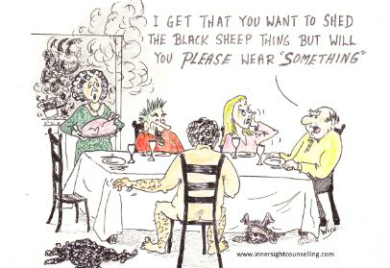7 Skills to Avoid Family Drama


Home for the Holidays: 7 Skills to Avoid Family Drama
Do your visions of the upcoming holiday season with your family conjure scenes from National Lampoon’s Christmas Vacation or does your mind venture into the dark terrain of Bad Santa? Does the phrase “home for the holidays” fill you with feelings of anticipation and excitement or the urge to set aside cash for an early departure change fee?
Ah, the holidays. How we love the food, the presents, the festivities. How we look forward to time off work. How we dread the inevitable family drama!
For most of us the fantasy of the ideal family portrait, bubbling over with a joyous and warm celebration, often clashes with bristling memories of past blow-outs, deep hurts and disappointment. Yet somehow each year we return with the feint hope that our family conflict will have evaporated, magically mellowing over time. Or, maybe, we can hope that an alien spaceship has abducted our family and replaced them with vacuous yet harmless cloned stand-ins.
If the alien abduction is not an option, however, you may want to consider a few proactive tools as you approach the impending holiday season. Although you can’t pick your family you can pick your point of view – or more specifically your role in the family drama.

Narratives: The Roles People Play
Our identities and perceptions about ourselves and others are formed by narratives. Narratives are stories we believe about ourselves or that others impose upon us be it our family or society at large. And, it is these narratives that effect our relationships and how we life.
Narratives take shape early in life as certain beliefs and events are determined to be important or true. These stories are further validated as we select only certain information while ignoring other events and truths, thus reinforcing one story over another. Subsequently, we adopt this story as our narrative and “play the part” accordingly. These narratives can be either inspiring or oppressive.
The Family Story
The same holds true in families which will have stories about the family as a whole as well as each individual member. Some of these stories can have a positive effect on us, others negative. However, all stories will dominate our beliefs, ideas, and play a large part in the how we see ourselves, approach relationships and live our lives.
Challenges surface when the narratives our family holds about us do not truly reflect who we are or allow us space to articulate our needs, wants and feelings. You will often hear about the golden child, the difficult child, the black sheep. These are imposed narratives and once imposed, become difficult for the labeled individual to escape.
The family unit, knowingly or unknowingly, anticipates and expects each individual to play his or her assigned role. And, like any biological organism the family unit will fight to maintain homeostasis. Change is frightening, it is uncomfortable, particularly if not all the players advocate for such change. There will be those family members who suffer withdrawal at your refusal to play your part. And, they will make desperate attempts to lure you into the performance, back to your previously agreed upon role.
The Great Escape: Stop Unhealthy Family Stories
So what do you do if the family narrative is not healthy for you?
There are simple approaches you can take to step out from underneath a unhealthy problem-saturated story – even if your family resists. This holiday season, we invite you to disengage from your historical role in the family drama, and re-author your own story, reclaiming your power.
You may not be able to heal old wounds and change the family narrative in one gathering but you can do your best to avoid the drama. By gaining a little perspective and a few tools for managing your emotions, you can enjoy holiday cheer minus the drama. More importantly, you will take your first step towards adopting a new role and a more empowering personal narrative.
Happy Holidays!





